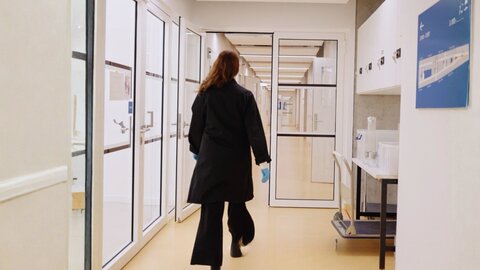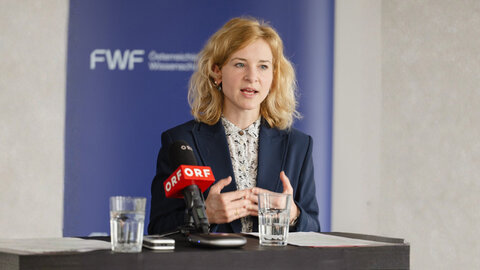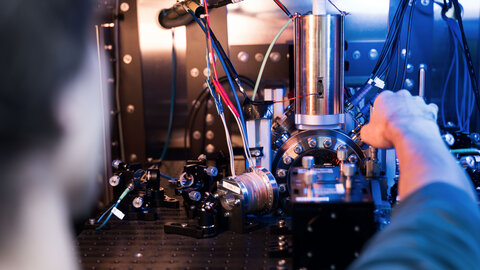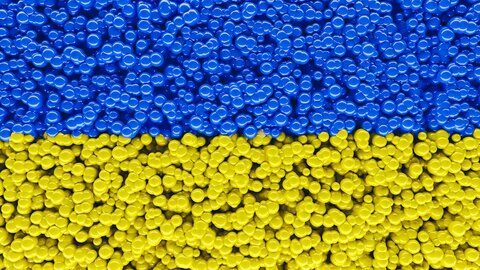Celebrating Successful Women in Cutting-Edge Research
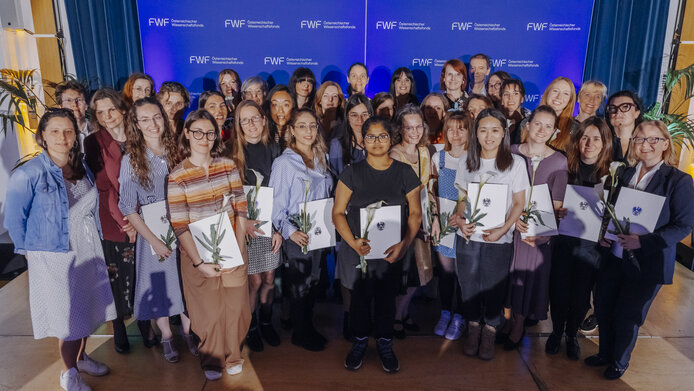
The FWF is currently funding 2,282 women in FWF projects throughout Austria. 34% of all principal investigators who received FWF funding last year are women. In 2023, a total of 59 women researchers in the postdoc and senior postdoc phases received ESPRIT or Elise Richter career funding. Last Tuesday, the 2023 newly approved principal investigators in the two programs met in Vienna to receive their awards and to network.
Federal Minister Martin Polaschek took the FWF awards ceremony as an opportunity to highlight women’s research achievements. “These awards impressively demonstrate the outstanding potential and excellence of women in science. The FWF’s career programs make an important contribution to a fairer distribution of opportunities in this highly competitive environment, and also to the effective advancement of women. At the Federal Ministry of Education, Science and Research, we are also committed to the successful advancement of girls and women along the entire educational chain, from kindergarten to cutting-edge research,” said Minister of Education, Science and Research Polaschek.
“It is also about actually implementing equality in science and research and acting as a role model for other areas of society. This is why, as an issue that affects all areas, it is important to make sure gender equality is firmly anchored in the objectives of universities, research institutions, and research funding organizations. A key success factor here is the institutions’ willingness to commit to a change in institutional culture. This is an important lever we can use to further increase the number of women in cutting-edge research,” explained Barbara Weitgruber, Head of Research at the Federal Ministry of Education, Science and Research, at the award ceremony.
“There are still significantly fewer women than men submitting applications to the FWF programs, meaning that only 34% of funding goes to women. We have not yet reached our goal and will continue our efforts in the future to create conditions that allow even more women to apply for funding and be successfully funded. We want to further reduce drop-outs and help to break through the glass ceiling in cutting-edge research. The participation of all organizations in the research field is key to creating more positions for successful young women researchers who can then also successfully acquire third-party funding,” says FWF President Christof Gattringer.
“Elise Richter was a pioneer who achieved a great deal for the recognition and academic progress of women in science on several levels – as a researcher, as the first female professor at the University of Vienna, and as a mentor and trailblazer for other successful women scientists. We are following in their footsteps today as we prove that scientific excellence is also female. FWF funding helps researchers master difficult and challenging phases early in their scientific careers and subsequently to establish themselves in academic competition,” explained neuroscientist Nicole Amberg on behalf of the award winners in her closing statement at the Urania in Vienna.
Networking and mentoring for women researchers
After the presentation of the funding awards, the discussions at the expert networking event focused on recipes for success, hurdles, and strategies for advancing gender equality in the sciences. The main topics were the challenges in this area. The new funding opportunities offered by the future FWF ASTRA Awards for established postdocs also took center stage. Renowned women researchers also gave insights into their experiences and exchanged ideas with their colleagues.
With this event, the FWF is helping to strengthen networks of excellent women researchers in Austria in the long term. The annual award and networking events are part of numerous activities and measures intended to support women in cutting-edge research and increase their visibility. These include gender equality measures such as the inclusion of equal opportunities aspects in the decision-making process, recognition of maternity leave, child allowances, and the reservation of 50% of funding for women researchers in the ESPRIT program. A study conducted in 2022 (GRANteD) issued the FWF good grades in terms of equality in an international comparison. As of summer 2024, the FWF will be setting new priorities in the advancement of women with the new ASTRA program and its tenure package for women.
Facts and figures on the advancement of women in the FWF’s career programs
In the ESPRIT career program, which is aimed specifically at postdocs, the FWF processed applications worth a total of €89 million in 2023. 83 proposals were approved, amounting to a funding volume of €27 million. 40 of the funded researchers are women and 43 are men. In the Elise Richter Program, the senior postdoc funding program for women, the FWF processed applications from 36 women researchers with a total volume of €12 million last year. Of these, the FWF was able to approve proposals submitted by 19 women researchers, amounting to a funding volume of €6.7 million. Detailed statistics can be found on the FWF website.
![[Translate to English:] Barbara Zimmermann am Rednerpult. Im Vordergrund Teilnehmer:innen.](/fileadmin/_processed_/3/9/csm_FWF_ESPRIT_RICHTER_cChristineMiess_003_c99e72f1a3.jpg)
![[Translate to English:] Barbara Weitgruber mit Mikro in der Hand](/fileadmin/_processed_/1/a/csm_FWF_ESPRIT_RICHTER_cChristineMiess_015_5b7b7cfa13.jpg)
![[Translate to English:] Zuhörer:innen bei der Auszeichnungsfeier](/fileadmin/_processed_/f/c/csm_FWF_ESPRIT_RICHTER_cChristineMiess_016_4d5f24235f.jpg)
![[Translate to English:] V.l.n.r.: Ursula Jakubek, Christof Gattringer sprechend mit Mikro in der Hand, Barbara Weitgruber, Barbara Zimmermann mit Mikro in der Hand](/fileadmin/_processed_/3/0/csm_FWF_ESPRIT_RICHTER_cChristineMiess_016_1_6db602241f.jpg)
![[Translate to English:] V.l.n.r.: Ursula Jakubek mit Mikro in der Hand, Christof Gattringer, und Barbara Weitgruber](/fileadmin/_processed_/c/7/csm_FWF_ESPRIT_RICHTER_cChristineMiess_017_a2f20841e2.jpg)
![[Translate to English:] Nicole Amberg am Rednerpult](/fileadmin/_processed_/5/8/csm_FWF_ESPRIT_RICHTER_cChristineMiess_050_97ca742e08.jpg)
![[Translate to English:] Nicole Amberg von hinten am Rednerpult mit applaudierenden Zuhörer:innen](/fileadmin/_processed_/0/6/csm_FWF_ESPRIT_RICHTER_cChristineMiess_053_8787ba827d.jpg)
![[Translate to English:] Großaufnahme von Blume auf Urkunde](/fileadmin/_processed_/6/c/csm_FWF_ESPRIT_RICHTER_cChristineMiess_171_e25d13e65b.jpg)
![[Translate to English:] Teilnehmer:innen auf nächtlicher Dachterrasse. Darüber große Kugelleuchte vor Nachthimmel.](/fileadmin/_processed_/4/d/csm_FWF_ESPRIT_RICHTER_cChristineMiess_183_f2431622b9.jpg)
